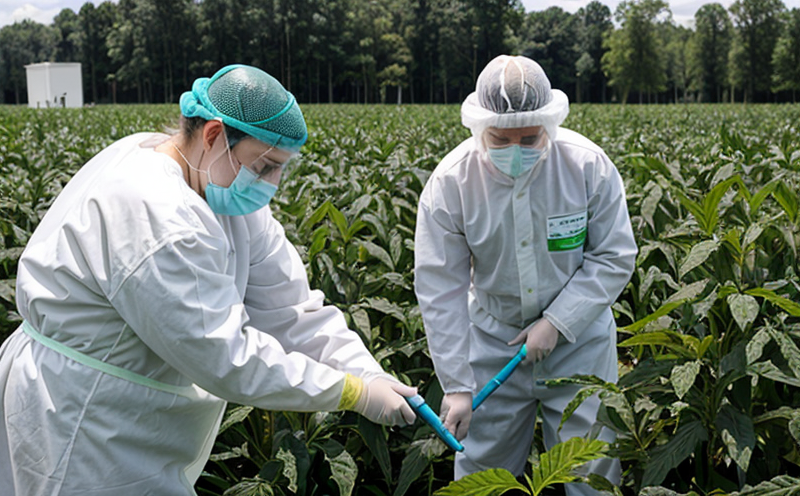USDA Agricultural Efficacy Testing of Beneficial Microorganisms
The United States Department of Agriculture (USDA) Agricultural Efficacy Testing of Beneficial Microorganisms is a critical service for ensuring the safety and efficacy of products used in agriculture. This testing ensures that beneficial microorganisms, which play crucial roles such as enhancing plant health or suppressing pathogens, are safe for use and effective in their intended applications.
The USDA Agricultural Efficacy Testing involves several key steps including product formulation, inoculum preparation, field application, and post-treatment sampling. The process is designed to evaluate the performance of biocontrol agents and beneficial microorganisms under controlled and real-world conditions. This service is particularly important for companies looking to commercialize innovative products that utilize these organisms.
One of the primary challenges in this testing lies in ensuring consistency between laboratory conditions and field performance. Our team addresses this by using advanced cultivation techniques that mimic natural environments as closely as possible. The testing protocol includes both short-term and long-term trials to capture immediate effects and sustained benefits over time.
The USDA Agricultural Efficacy Testing also involves extensive quality control measures to ensure the reliability of our results. This includes rigorous validation of test methods, calibration of equipment, and regular audits by independent experts. The service is designed to meet strict regulatory requirements set forth by various standards including ISO 17025 for proficiency.
The importance of this testing cannot be overstated in today’s competitive agricultural market. By ensuring that beneficial microorganisms perform as expected both in the lab and on farms, we help our clients gain a competitive edge. This service is particularly valuable for companies developing new products or seeking to expand their offerings into biocontrol markets.
Our testing facility uses state-of-the-art equipment and adheres strictly to internationally recognized standards such as ISO 14644-1:2019, ensuring that all tests are conducted in a cleanroom environment. This ensures that the results we provide are accurate and reliable, which is essential for regulatory approval.
The service also includes detailed reporting tailored to meet the needs of various stakeholders including researchers, product developers, and regulators. The report typically covers key parameters such as viability rates, growth potential, and interaction with host plants or soil conditions. This information is crucial for understanding how these microorganisms behave in different environments and under varying stress conditions.
The USDA Agricultural Efficacy Testing of Beneficial Microorganisms is not just about compliance; it’s about innovation. By providing data that can be used to improve product formulations, extend shelf life, or enhance efficacy, we support the continuous advancement of agricultural practices. This service plays a pivotal role in fostering sustainable agriculture by encouraging the use of environmentally friendly solutions.
Our comprehensive approach ensures that every aspect of the testing process is meticulously documented and reviewed, providing clients with confidence in their product’s performance. Whether you are a small startup or a large corporation, this service can help you navigate the complexities of bringing beneficial microorganisms to market efficiently and effectively.
Industry Applications
| Application | Description |
|---|---|
| Biofertilizers | Evaluating the ability of microorganisms to enhance nutrient availability for plants. |
| Biopesticides | Testing for efficacy against pests and pathogens, ensuring they do not harm beneficial insects or soil health. |
| Sustainable Agriculture | Supporting sustainable practices through the use of microorganisms that promote soil health and reduce chemical inputs. |
| Phytoremediation | Evaluating microorganisms’ ability to degrade pollutants in agricultural settings, improving land quality for cultivation. |
| Disease Suppression | Testing the effectiveness of beneficial microorganisms in suppressing plant diseases without compromising crop yield. |
Why Choose This Test
The USDA Agricultural Efficacy Testing of Beneficial Microorganisms is an essential service for several reasons. Firstly, it provides a clear path to regulatory approval by ensuring that products meet stringent standards and guidelines set forth by the USDA and other relevant bodies.
- Regulatory Compliance: Ensures compliance with international and national regulations, thereby reducing the risk of product recall or ban.
- Innovation Support: Encourages innovation in biocontrol products, supporting sustainable agricultural practices and enhancing crop yields.
- Enhanced Reputation: Demonstrates a commitment to quality and safety, which can significantly enhance brand reputation among consumers and stakeholders.
- Market Entry: Facilitates market entry by providing robust data that can be used in product labeling and marketing strategies.
- Customer Confidence: Builds trust with end-users who are increasingly concerned about the safety and efficacy of agricultural products.
- Sustainability: Supports sustainable practices, aligning with global trends towards more environmentally friendly agricultural solutions.
In summary, choosing this test is a strategic decision that not only ensures compliance but also drives innovation and enhances market entry opportunities. It is a cornerstone of success for companies looking to establish themselves in the rapidly growing biocontrol market.
Quality and Reliability Assurance
- Rigorous Validation of Test Methods: Ensuring all methods used in the testing process meet the highest standards.
- Calibration of Equipment: Regular calibration to guarantee accurate results.
- Independent Expert Audits: Periodic audits by independent experts to ensure continuous quality assurance.
- Cleanroom Environment: Testing conducted in a controlled, clean environment to prevent contamination and ensure reliable data.
- Compliance with ISO Standards: Adherence to international standards such as ISO 14644-1:2019 for proficiency and reliability.
- Data Integrity: Maintaining the integrity of all data throughout the testing process, ensuring transparency and traceability.
- Continuous Improvement: Regularly updating protocols based on new research and industry best practices to maintain the highest quality standards.





